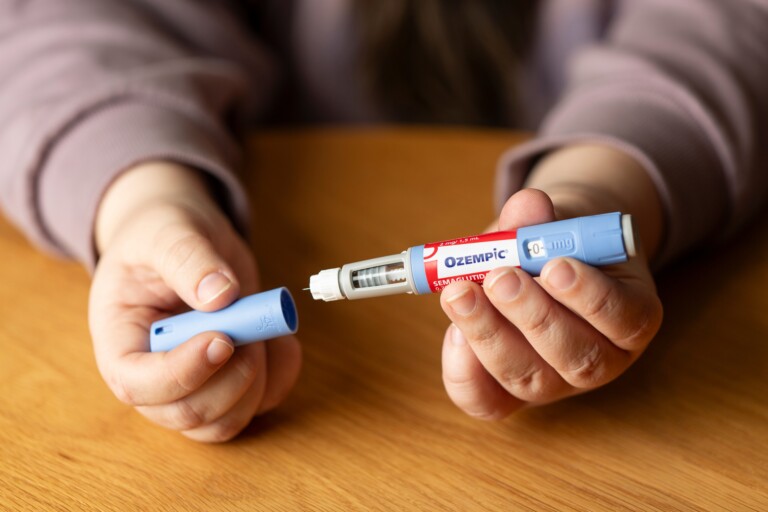In recent years, the drug Ozempic has gained immense popularity for its effectiveness as a weight loss drug. Originally developed to treat type 2 diabetes, Ozempic is now widely used off-label for weight loss. While its effectiveness in shedding pounds is remarkable, dental professionals should be aware of its potential side effects on oral health. We explore the rise of Ozempic, its extended use for weight loss, and the unexpected dental issues that may arise from its use.

The Rise of Ozempic
Ozempic, with the active ingredient semaglutide, was first approved by the U.S. Food and Drug Administration (FDA) in 2017 for managing type 2 diabetes. As a GLP-1 receptor agonist, Ozempic helps regulate blood sugar levels by stimulating insulin production and reducing the amount of sugar the liver releases into the bloodstream.
Patients and doctors quickly noticed an additional benefit: significant weight loss. This led to a surge in off-label prescriptions for weight management, even among individuals without diabetes. By 2020, Ozempic became a household name, touted as a purported “miracle” drug for those struggling with obesity.
Expansion of Off-Label Use
The off-label use of Ozempic for weight loss expanded rapidly, driven by promising clinical trial results and glowing testimonials. Social media platforms were flooded with stories of dramatic transformations, fueling public interest. Celebrities and influencers like Elon Musk, Sharon Osbourne, and members of the cast of the Real Housewives television show endorsed the drug’s effectiveness, further boosting its popularity.
However, this widespread use raised concerns among healthcare professionals. While Ozempic’s benefits for weight loss are well-documented, less attention has been given to its potential side effects, particularly those affecting dental health.
Possible Dental Effects of Ozempic
As dental professionals, it is crucial to understand the potential oral health consequences associated with Ozempic. It is important to note that, because the use of these drugs—both on and off label—is still so new, there is not yet any research directly linking Ozempic and other weight loss drugs with oral side effects. However, because of how the drug works, there are numerous areas that present problems for oral health.
There is also a wealth of anecdotal evidence: some users have reported problems like halitosis, gum inflammation, dry mouth, and what’s being referred to as “Ozempic breath” or “Ozempic burp.” This particular pungent bad breath is believed to stem from the drug’s mechanism of action. Since food stays in the stomach longer, it seems like it may cause an unpleasant or rotting smell.
Here are some key areas of concern:
Dry Mouth (Xerostomia)
One of the most common side effects of Ozempic is dry mouth. Xerostomia occurs when the salivary glands do not produce enough saliva, leading to a parched feeling in the mouth. Saliva is essential for maintaining oral health as it helps neutralize acids, wash away food particles, and protect teeth from decay. Chronic dry mouth can increase the risk of cavities, gum disease, and oral infections.
Taste Alterations
Some users of Ozempic report experiencing changes in their sense of taste. This can range from a metallic taste to a complete loss of taste. While these alterations might seem minor, they can affect a person’s diet and nutrition, which in turn can impact oral health. For instance, if patients avoid certain foods because they no longer taste good, they might miss out on essential nutrients needed for healthy teeth and gums.
Nausea and Vomiting
Nausea and vomiting are also reported side effects of Ozempic. Frequent vomiting can lead to erosion of tooth enamel due to stomach acids. Enamel erosion can cause teeth to become sensitive, discolored, and more prone to cavities. Dental professionals should advise patients on how to protect their teeth if they experience these symptoms, such as rinsing their mouth with water or a fluoride rinse after vomiting.
Reduced Appetite
Ozempic helps reduce appetite, which can lead to lower food intake. While this is beneficial for weight loss, it can also result in nutritional deficiencies. Adequate intake of vitamins and minerals is vital for maintaining healthy teeth and gums. Dental professionals should monitor patients for signs of malnutrition and provide guidance on maintaining a balanced diet.

Advice for Dental Professionals
Given the potential dental side effects of Ozempic, dental professionals should take proactive steps to support their patients. Here are some recommendations:
- Patient Education: Inform patients about the potential oral health side effects of Ozempic. Explain the importance of maintaining good oral hygiene, staying hydrated, and having a balanced diet.
- Regular Check-Ups: Encourage patients using Ozempic to schedule regular dental check-ups. Early detection of issues like dry mouth or enamel erosion can prevent more severe problems down the line.
- Saliva Substitutes: Recommend saliva substitutes or mouthwashes designed to alleviate dry mouth symptoms. Over-the-counter products are available, and in severe cases, prescription medications might be necessary.
- Fluoride Treatments: Suggest fluoride treatments to strengthen enamel and protect against cavities, especially for patients experiencing frequent vomiting or dry mouth.
- Nutritional Counseling: Work with patients to ensure they receive adequate nutrition, emphasizing foods rich in vitamins and minerals crucial for oral health, such as calcium, vitamin D, and phosphorus.

Conclusion
Ozempic has proven to be a game-changer for weight loss, offering hope to many struggling with obesity. However, its use is not without potential side effects, including those that affect dental health. As dental professionals, it is essential to stay informed about these risks and provide patients with the guidance and care needed to maintain their oral health while benefiting from this medication. Through education, regular monitoring, and preventive measures, we can help patients achieve both their weight loss and oral health goals.




